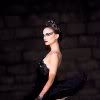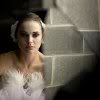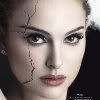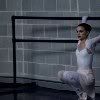
Once in a while there comes a psychological drama that blows our mind. Black Swan is less about ballet than the slow mental breakdown of an artist who takes her art too seriously.
 Nina Sayers (Natalie Portman) has been with the New York Ballet for four years but has never risen above the rank of "featured dancer." Her opportunity comes when prima donna Beth (Winona Ryder) is "retiring" (basically, she got the sack). Director Thomas (Vincent Cassel) is staging a new version of Swan Lake and he needs a new leading lady who can dance both the White Swan and the Black Swan. Nina, an introverted woman who has superb technical skills, is perfect for the role of the White Swan, but she is too fragile and frigid to do the Black Swan justice. However, Thomas realizes Nina is the best dancer he has (technically) and she is beautiful, so he gives the role of the Swan Queen to Nina, in hopes that she could let loose and pour her feelings into the roles.
Nina Sayers (Natalie Portman) has been with the New York Ballet for four years but has never risen above the rank of "featured dancer." Her opportunity comes when prima donna Beth (Winona Ryder) is "retiring" (basically, she got the sack). Director Thomas (Vincent Cassel) is staging a new version of Swan Lake and he needs a new leading lady who can dance both the White Swan and the Black Swan. Nina, an introverted woman who has superb technical skills, is perfect for the role of the White Swan, but she is too fragile and frigid to do the Black Swan justice. However, Thomas realizes Nina is the best dancer he has (technically) and she is beautiful, so he gives the role of the Swan Queen to Nina, in hopes that she could let loose and pour her feelings into the roles. Nina goes from being elated of finally getting her big break to feeling the immense pressure of dancing the dual roles. She has tremendous problems letting go and getting in touch with her seductress/vixen side. Her protective mother, ex-ballerina Erica (Barbara Hershey), doesn't help either by treating Nina as her "sweet little girl." On top of all the pressure of being perfect, Nina becomes paranoid of a new dancer Lily (Mila Kunis) who, while technically inferior to Nina, has just the right amount of seductive sexiness to pull off the role of the Black Swan. Threatened by her own inadequacy and Lily, Nina struggles to achieve the perfection she so desires, yet begins to learn to let loose and tap into her darker side.
Nina goes from being elated of finally getting her big break to feeling the immense pressure of dancing the dual roles. She has tremendous problems letting go and getting in touch with her seductress/vixen side. Her protective mother, ex-ballerina Erica (Barbara Hershey), doesn't help either by treating Nina as her "sweet little girl." On top of all the pressure of being perfect, Nina becomes paranoid of a new dancer Lily (Mila Kunis) who, while technically inferior to Nina, has just the right amount of seductive sexiness to pull off the role of the Black Swan. Threatened by her own inadequacy and Lily, Nina struggles to achieve the perfection she so desires, yet begins to learn to let loose and tap into her darker side. Natalie Portman (Thor) has found a perfect role for herself. The effervescent Portman is excellent as the fragile, frigid, and frightened dancer. To prepare for the role, Portman spent a year training (she already had a background in ballet), and the effort pays off. She looks and acts convincingly (while some of the more sophisticated footwork is done by a double). Most impressive, however, is her emotional range in addition to the physical agility. Ms. Portman's tour-de-force performance would definitely get her an Oscar nomination, if not the actual statuette.
Natalie Portman (Thor) has found a perfect role for herself. The effervescent Portman is excellent as the fragile, frigid, and frightened dancer. To prepare for the role, Portman spent a year training (she already had a background in ballet), and the effort pays off. She looks and acts convincingly (while some of the more sophisticated footwork is done by a double). Most impressive, however, is her emotional range in addition to the physical agility. Ms. Portman's tour-de-force performance would definitely get her an Oscar nomination, if not the actual statuette. While Ms. Portman carries the entire film on her little dancing feet, the stellar supporting cast includes Mila Kunis (Date Night), who gives possibly her best performance to date as Nina's free-spirit rival. Kunis is gorgeous, of course, but it is her character's sexy, wild personality that is the perfect counterpoint to Portman's frigid beauty. They greatly complement each other. Vincent Cassel (Ocean's Thirteen) is perfect as company director Thomas. He's passionate, brutal, demanding, caring, sexual, artistic… his impeccable performance gives us a three-dimensional character for us to love to hate and hate to love.
While Ms. Portman carries the entire film on her little dancing feet, the stellar supporting cast includes Mila Kunis (Date Night), who gives possibly her best performance to date as Nina's free-spirit rival. Kunis is gorgeous, of course, but it is her character's sexy, wild personality that is the perfect counterpoint to Portman's frigid beauty. They greatly complement each other. Vincent Cassel (Ocean's Thirteen) is perfect as company director Thomas. He's passionate, brutal, demanding, caring, sexual, artistic… his impeccable performance gives us a three-dimensional character for us to love to hate and hate to love. Barbara Hershey (Childless) is wonderful as Nina's manipulative and protective mother, Erica. Ms. Hershey's great emotional range adds to the character and also the dysfunctional relationship between Erica and Nina, which is important for us to understand Nina and her plight. Winona Ryder (Star Trek) has always been a good actress, and here, she struts her stuff as the fading star who's been tossed away like yesterday's newspapers. Perhaps Ms. Ryder drew from her own experiences; the result is fantastic. Choreographer Benjamin Millepied, who plays David/the Prince (he is also Ms. Portman's real-life fiance and father of her child; they met on the set of this movie), gives the dancing scenes some gravitas with his superb skills and grace.
Barbara Hershey (Childless) is wonderful as Nina's manipulative and protective mother, Erica. Ms. Hershey's great emotional range adds to the character and also the dysfunctional relationship between Erica and Nina, which is important for us to understand Nina and her plight. Winona Ryder (Star Trek) has always been a good actress, and here, she struts her stuff as the fading star who's been tossed away like yesterday's newspapers. Perhaps Ms. Ryder drew from her own experiences; the result is fantastic. Choreographer Benjamin Millepied, who plays David/the Prince (he is also Ms. Portman's real-life fiance and father of her child; they met on the set of this movie), gives the dancing scenes some gravitas with his superb skills and grace. The screenplay by Mark Heyman (The Skeleton Twins) and John McLaughlin (Man of the House) follows Andres Heinz's twisted psychology story, which begins slowly. As the fringes of Nina's mental wellbeing unravel, the plot picks up its speed in certain bizarre and unpredictable twists. Suddenly we realize what we see is not always real. Told from the point of view of Nina, who is an unreliable character to say the least, the story takes on interesting turns that leaves us questioning, "What is reality and what is Nina's hallucination?" The taut screenplay also doesn't talk down to the audience by trying to explain everything. In fact, plenty is left unexplained, leaving the story to the audiences' own interpretations.
The screenplay by Mark Heyman (The Skeleton Twins) and John McLaughlin (Man of the House) follows Andres Heinz's twisted psychology story, which begins slowly. As the fringes of Nina's mental wellbeing unravel, the plot picks up its speed in certain bizarre and unpredictable twists. Suddenly we realize what we see is not always real. Told from the point of view of Nina, who is an unreliable character to say the least, the story takes on interesting turns that leaves us questioning, "What is reality and what is Nina's hallucination?" The taut screenplay also doesn't talk down to the audience by trying to explain everything. In fact, plenty is left unexplained, leaving the story to the audiences' own interpretations. The most impressive aspect of the story is the character development. We get three-dimensional characters who are neither saints or devils, just human beings trying to find their places in this world but also transcend their mortality. The relationship between Nina and her mother is particularly complex and multilayered. The sexual tension between Thomas and Nina is just as palpable as that between Nina and Lily, which gives the story a dark, unconventional sexual energy that is the antithesis of Nina's control and quest for perfection.
The most impressive aspect of the story is the character development. We get three-dimensional characters who are neither saints or devils, just human beings trying to find their places in this world but also transcend their mortality. The relationship between Nina and her mother is particularly complex and multilayered. The sexual tension between Thomas and Nina is just as palpable as that between Nina and Lily, which gives the story a dark, unconventional sexual energy that is the antithesis of Nina's control and quest for perfection. Director Darren Aronofsky is, as usual, amazing. Granted, the story shares a lot of similarities with his last film, The Wrestler. But this version superbly wraps a psychological drama around a beautiful, artistic production. Aronofsky has always been drawn to unusual, dark, and emotionally draining stories such as Requiem for a Dream or Pi. He's done the same here, especially with his extreme closeups and claustrophobic framing. The score by Clint Mansell, mixed with the glorious music of Swan Lake, is fantastically creepy. The editing is excellent and taut, and especially thrilling during the intercuts of the dance movements, between Ms. Portman and her dance double, and between reality and fantasy.
Director Darren Aronofsky is, as usual, amazing. Granted, the story shares a lot of similarities with his last film, The Wrestler. But this version superbly wraps a psychological drama around a beautiful, artistic production. Aronofsky has always been drawn to unusual, dark, and emotionally draining stories such as Requiem for a Dream or Pi. He's done the same here, especially with his extreme closeups and claustrophobic framing. The score by Clint Mansell, mixed with the glorious music of Swan Lake, is fantastically creepy. The editing is excellent and taut, and especially thrilling during the intercuts of the dance movements, between Ms. Portman and her dance double, and between reality and fantasy.  Aronofsky also uses skillful cinematic tricks to give us the illusions: Is it real or is it not? In fact, I'm beginning to question whether Nina's mother is real, and Aronofsky's direction leaves a lot of room for interpretation. Aronofsky also induces horror by aiming the camera directly at some disturbing images, never shying away. The climactic scenes, from the time Nina transforms herself to the evil Black Swan and then on to the finale as the fragile White Swan, are exhilarating to watch, to listen to, and to feel.
Aronofsky also uses skillful cinematic tricks to give us the illusions: Is it real or is it not? In fact, I'm beginning to question whether Nina's mother is real, and Aronofsky's direction leaves a lot of room for interpretation. Aronofsky also induces horror by aiming the camera directly at some disturbing images, never shying away. The climactic scenes, from the time Nina transforms herself to the evil Black Swan and then on to the finale as the fragile White Swan, are exhilarating to watch, to listen to, and to feel. I didn't know what to expect. What I got out of the film is an incredible rush, and a deeply disturbing, fascinating, and emotional journey of an artist sinking into insanity in search of perfection. The film is as black as our twisted thoughts would allow, and as graceful as the swan we revere.
I didn't know what to expect. What I got out of the film is an incredible rush, and a deeply disturbing, fascinating, and emotional journey of an artist sinking into insanity in search of perfection. The film is as black as our twisted thoughts would allow, and as graceful as the swan we revere. Stars: Natalie Portman, Mila Kunis, Vincent Cassel, Barbara Hershey, Winona Ryder, Benjamin Millepied
Director: Darren Aronofsky
Writers: Mark Heyman, Andres Heinz, John McLaughlin
Distributor: Fox Searchlight
MPAA Rating: R for strong sexual content, disturbing violent images, language and some drug use
Running Time: 108 minutes
Ratings:
Script – 8
Performance – 9
Direction – 9
Cinematography – 8
Music/Sound– 9
Editing – 9
Production – 8
Total – 8.6 out of 10
No comments:
Post a Comment